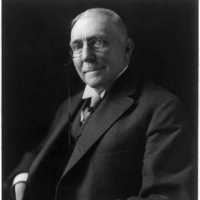At Noey’s House
At Noey’s house—when they arrived with him—
How snug seemed everything, and neat and trim:
The little picket-fence, and little gate—
It’s little pulley, and its little weight,—
All glib as clock-work, as it clicked behind
Them, on the little red brick pathway, lined
With little paint-keg-vases and teapots
Of wee moss-blossoms and forgetmenots:
And in the windows, either side the door,
Were ranged as many little boxes more
Of like old-fashioned larkspurs, pinks and moss
And fern and phlox; while up and down across
Them rioted the morning-glory-vines
On taut-set cotton-strings, whose snowy lines
Whipt in and out and under the bright green
Like basting-threads; and, here and there between,
A showy, shiny hollyhock would flare
Its pink among the white and purple there.—
And still behind the vines, the children saw
A strange, bleached, wistful face that seemed to draw
A vague, indefinite sympathy. A face
It was of some newcomer to the place.—
In explanation, Noey, briefly, said
That it was ‘Jason,’ as he turned and led
The little fellows ‘round the house to show
Them his menagerie of pets. And so
For quite a time the face of the strange guest
Was partially forgotten, as they pressed
About the squirrel-cage and rousted both
The lazy inmates out, though wholly loath
To whirl the wheel for them.—And then with awe
They walked ’round Noey’s big pet owl, and saw
Him film his great, clear, liquid eyes and stare
And turn and turn and turn his head ‘round there
The same way they kept circling—as though he
Could turn it one way thus eternally.
Behind the kitchen, then, with special pride
Noey stirred up a terrapin inside
The rain-barrel where he lived, with three or four
Little mud-turtles of a size not more
In neat circumference than the tiny toy
Dumb-watches worn by every little boy.
Then, back of the old shop, beneath the tree
Of ’rusty-coats,' as Noey called them, he
Next took the boys, to show his favorite new
Pet ‘coon—pulled rather coyly into view
Up through a square hole in the bottom of
An old inverted tub he bent above,
Yanking a little chain, with ’Hey! you, sir!
Here’s _comp’ny_ come to see you, Bolivur!'
Explanatory, he went on to say,
‘I named him ’_Bolivur_' jes thisaway,—
He looks so _round_ and _ovalish_ and _fat_,
‘Peared like no other name ’ud fit but that.'
Here Noey’s father called and sent him on
Some errand. ‘Wait,’ he said—'I won’t be gone
A half a’ hour.—Take Bud, and go on in
Where Jason is, tel I git back agin.'
Whoever _Jason_ was, they found him there
Still at the front-room window.—By his chair
Leaned a new pair of crutches; and from one
Knee down, a leg was bandaged.—'Jason done
That-air with one o’ these-'ere tools _we_ call
A '_shin-hoe_'—but a _foot-adz_ mostly all
_Hardware_-store-keepers calls ‘em.’—(_Noey_ made
This explanation later.)
Jason paid
But little notice to the boys as they
Came in the room:—An idle volume lay
Upon his lap—the only book in sight—
And Johnty read the title,—'Light, More Light,
There’s Danger in the Dark,'—though _first_ and best—
In fact, the _whole_ of Jason’s interest
Seemed centered on a little _dog_—one pet
Of Noey’s all uncelebrated yet—
Though _Jason_, certainly, avowed his worth,
And niched him over all the pets on earth—
As the observant Johnty would relate
The _Jason_-episode, and imitate
The all-enthusiastic speech and air
Of Noey’s kinsman and his tribute there:—

